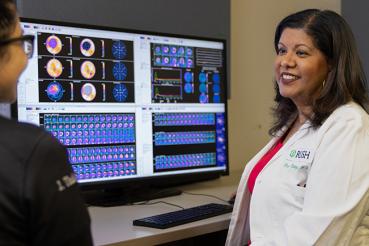Atrial fibrillation, one of the most common types of heart arrhythmias, has long been considered more common in men.
But new research indicates that may not be the case.
A recent study in in JAMA Cardiology suggests that when height is accounted for, women are actually more likely than men to have AFib. This is a major shift in traditional thinking about the condition, which can result in stroke, heart failure and other heart-related complications.
Erica Engelstein, MD, cardiologist and electrophysiologist at RUSH, wasn’t surprised.
“I think, just generally speaking, atrial fibrillation is a much more prevalent disease nowadays because we live longer,” she said. “Since age is such a big factor and women tend to live longer, we actually see more women with atrial fibrillation than we see men. I just see them at different times in their lives.”
Women and AFib: What you need to know
The VITAL Rhythm Trial, a study out of Cedars-Sinai Hospital and Harvard University, found that when height was accounted for, women were 50% more likely than men to develop AFib in their lives. But while women may be more at risk, Engelstein cautioned that there are many other risk factors for developing the condition — and some risk factors have a much stronger link to AFib.
“High blood pressure, diabetes, obesity, alcohol and sleep apnea are some of the very strong, and, most importantly, modifiable, risk factors for atrial fibrillation.” she said.
Treatment of AFib in women comes with significant differences compared to men. The risk of stroke due to AFib is higher in women, and they may need blood thinners sooner than men to prevent them. Also, certain medications to prevent AFib may be more dangerous in women than in men and are associated with a higher risk of dangerous heart rhythm problems in the bottom chambers of the heart.
“When we treat women, they tend to have more issues, because specific medications actually cause more problems in women than in men,” Engelstein said.
What is atrial fibrillation?
AFib is characterized by a rapid, irregular heartbeat in the upper chambers of the heart. Normally, a heartbeat starts in one spot called the sinus node in the upper chambers of the heart, and travels down special electrical wires to the bottom chambers. When a patient is in AFib, the upper chambers of the heart “quiver” instead of beat, with a rapid rhythm coming from all over the upper chambers instead of one spot.
Engelstein said people with AFib may have severe symptoms immediately upon developing it, while others can live for months or years without knowing that they have the condition.
“About half the patients may not have any symptoms at the beginning, and half the patients will feel it the second they go into atrial fibrillation,” she said. “Those that have symptoms complain about palpitations and irregular pulse, rapid pulse. They just don't feel right. Whether patients with atrial fibrillation have symptoms or not, the effects are the same.”
Other patients don't feel the actual atrial fibrillation but rather feel its consequences, including symptoms like shortness of breath with exertion, fatigue, lightheadedness or chest discomfort. AFib may occur for a period of time and then go away, but it often recurs if left untreated.
How can you prevent AFib?
Fortunately, there are several risk factors for atrial fibrillation which can be treated both in women and men, in order to reduce their risk of AFib.
“Examples are regular exercise and maintaining a normal weight,” Engelstein said. “If you have high blood pressure, make sure it's well controlled. Look for sleep apnea and disrupted sleep patterns, and treat sleep apnea if you have it.”
Engelstein also recommended a healthy diet, rich in fruits and vegetables, whole grains, legumes, and lean protein. Avoiding alcohol can also be helpful, according to Engelstein.
“I don't think there is a safe amount of alcohol when it comes to atrial fibrillation,” she said. “Even a little bit of alcohol can trigger atrial fibrillation in people who are predisposed to it.”
Engelstein stressed that whether you are a woman or a man, your risk of AFib increases as you get older, so prevention, and proper treatment as early as possible, are the keys to preventing AFib development or recurrence. Wearable monitors such as watches that can detect atrial fibrillation are now widely available, and are gaining an increasing role in the detection and management of the condition.
“There's increasing evidence that if we intervene early enough — with lifestyle changes, risk factor modification, and treatments — we can halt the progression of the disease and have a longer-term impact.”




